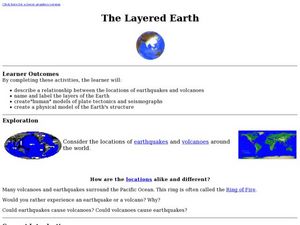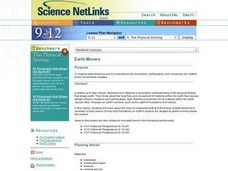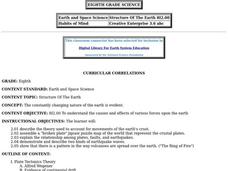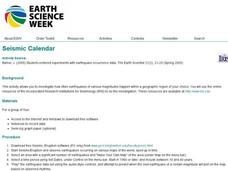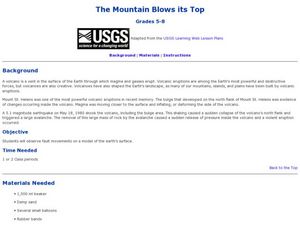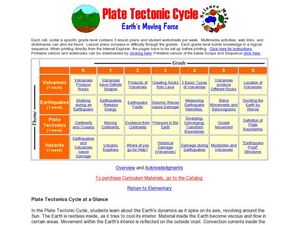Curated OER
Mantle Motions
Students define vocabulary words associated with lithospheric plate motions. They create and write down a motion to act out each vocabulary word, and participate in a game of demonstrating the actions associated with each word.
Curated OER
Whole Lotta Shaking Going On
Students explore earthquake activity in California. They observe the historical data and create databases and graphs of the earthquakes. Students analyze the data and form a hypothesis about future earthquakes.
Curated OER
Earth's Plate Tectonics
Students identify the different layers of the Earth. In this earth science lesson, students create a model of the crusts and continents. They explain how plates movement cause earthquakes and volcanoes.
Curated OER
The Layered Earth
Students role play plate tectonics by creating a "plate statue" made up of students. In this earth science instructional activity, students describe how Earth's movement cause earthquakes and volcanoes. They draw and name the different...
Curated OER
Plate Tectonics
Pupils identify that most of mountain ranges found on all major land masses and in the oceans are external reflections of tectonic movements within the earth. They identify that earthquakes and related phenomena are caused by the...
Curated OER
Earth Movers
Young scholars read an online article about an earthquake and follow up with a series of discussion questions about earthquakes. They answer questions in their science journals about continental drift, plate tetonics, and their...
Curated OER
Explosive Ideas!
Students explore the layers of the Earth and the dynamic changes that they cause on Earth's surface. Volcanoes and earthquakes become the focus of the lesson as the Oregon State quarter and its Crater Lake images are linked to the topic.
Curated OER
Science Italian Style: Eruption!
Young scholars explore ways scientists prepare for a volcanic eruption. They observe films of earthquakes, oil spills, volcanoes and hurricanes. Students perform activities to demonstrate the relationship of viscosity to lava flow. ...
Curated OER
Forces of Change
Second graders discuss various ways in which landforms change over time. They, in groups, research and create a reference book about landform change including tsunamis, earthquakes, weathering, erosion and volcanic eruptions.
Curated OER
Structure of the Earth
Eighth graders examine the forces that are constantly acting on the Earth. They describe the theory of tectonic plates and demonstrate the two kinds of earthquake waves. They also examine the role of volcanoes in the structure of the...
Curated OER
Volcanic Unrest
Students explore the Ring of Fire. In this volcano lesson, students discuss active volcanoes in the world and explore viscosity as they participate in a hands-on classroom activity.
Curated OER
Seismic Calendar
Students discover how often earthquakes happen in a region of their choice. In this science lesson, students use online resouces to help them do their investigations. Students make their own map of their region and show how many...
Curated OER
The Mountain Blows its Top
Students replicate a volcanic eruption. In this volcanoes lesson, students follow the provided procedures to show and describe how the inflation of a bulge led to the eruption of Mount St. Helens.
Curated OER
Mount St. Helens Shakes and Burps
Young scholars uncover the nature of volcanoes and locate some of the world's active, dormant, and extinct volcanoes. They also discover how scientists detect, measure, and predict volcanic activity.
Curated OER
What's The Difference?
Students identify geologic features that are associated with volcanoes. In this volcanic exploration lesson students compare and contrast convergent and divergent volcanoes and are able to explain why some erupt more explosively.
Curated OER
What's the Difference?
Students discover how volcanic processes differ at convergent and divergent tectonic plate boundaries. They identify three geologic features that are associated with most volcanoes on Earth.
Curated OER
The Fault Line
Students use cardboard models of the North American and Pacific plates and sand to investigate what happens when there is an earthquake or movement along the boundaries of the plates.
Curated OER
Tracking Current "Earth" Events
Eighth graders utilize Internet research skills, and practice their communication skills by presenting their research to the clas. They actively consider the types of hazards for humans associated with Natural Disaters and ways that...
Curated OER
Plate Tectonic Cycle
Students explore the Earth's movements by completing worksheets. In this plate tectonics lesson, students define such natural disasters as volcanoes, earthquakes, tsunamis and mudslides and discuss their connections to plate tectonics....
Curated OER
Survival Experts
Students take on the role of survival experts as they research and produce brochures or guides to educate others about what to do in the event of a natural disaster.
Curated OER
Volcano!-Thar She Blows!
Middle schoolers describe how volcanoes are formed. They name the types of boundaries where volcanoes occur. They utilize models to illustrate the occurence of volcanoes and earthquakes along plate boundaries. They compare and constrast...
Curated OER
Normal (dip-slip) Earthquake!
Students label the fault lines and tectonic plate boundaries on the world map. In this earth science activity, students simulate ocean floor formation using CEENboTs. They explain the causes of earthquakes.
Curated OER
The Changing Earth
Students explore the Earth's crust. In this earth science lesson plan, students participate in 2 activities that demonstrate physical and chemical weathering. Students also play Jeopardy with topics including volcanoes, earthquakes,...
Curated OER
Earthquake Waves
Fourth graders pour three cups of sand on the top of a plastic table near the edge. They tap the table lightly with the rubber mallet. When they tap the table lightly they see the sand ump into the air.





